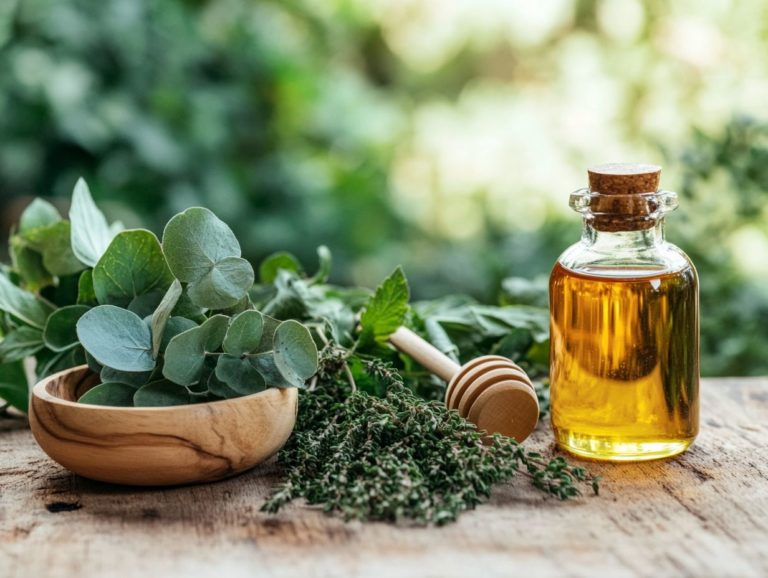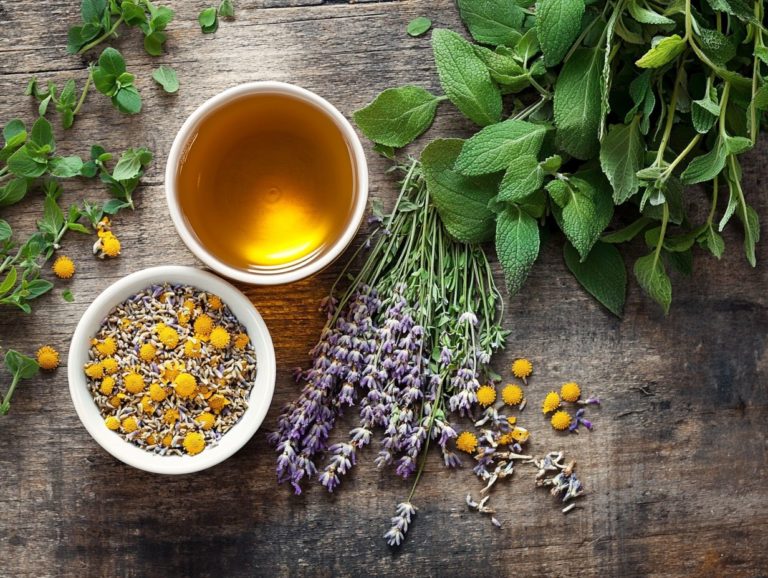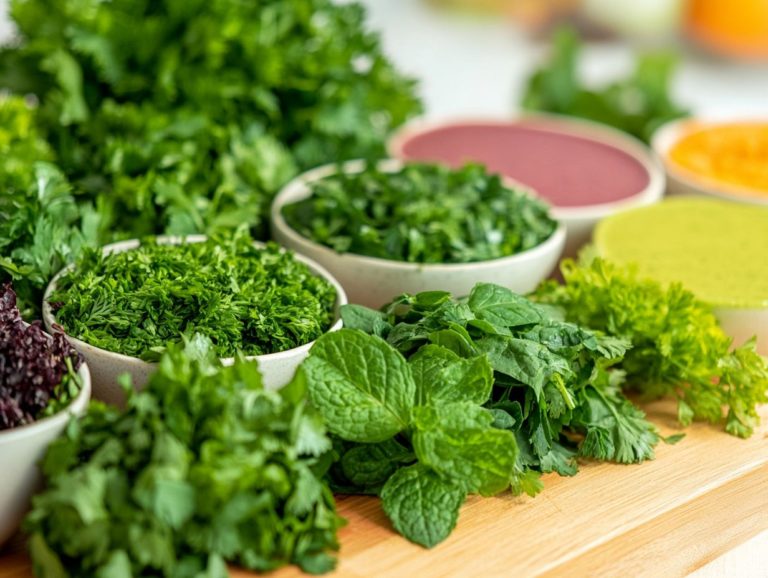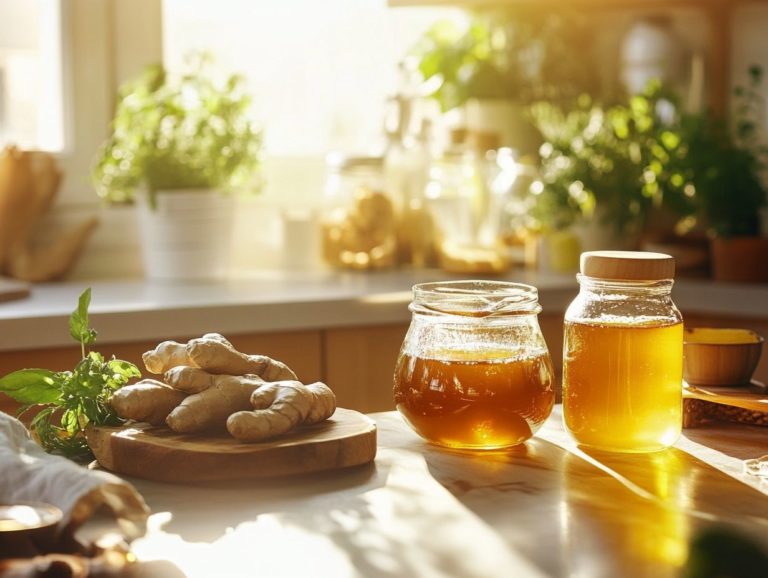5 Easy Herbal Remedies You Can Make
In today s fast-paced world, you might be looking for natural solutions to common health problems. Herbal remedies offer a gentle yet effective approach to wellness, often using ingredients already in your kitchen.
This article introduces five simple herbal remedies like peppermint tea for digestive issues and garlic oil for ear infections. You ll learn how to make them at home and understand their benefits and risks.
Discover how these amazing natural remedies can boost your health!
Contents
- Key Takeaways:
- 1. Peppermint Tea for Digestive Issues
- 2. Garlic Oil for Ear Infections
- 3. Turmeric Paste for Inflammation
- 4. Chamomile Salve for Skin Irritations
- 5. Ginger and Honey Syrup for Cough and Cold
- What Are Herbal Remedies and How Do They Work?
- Frequently Asked Questions
- What are 5 easy herbal remedies that I can make at home?
- Are these herbal remedies safe to use?
- Do I need special equipment or ingredients to make these remedies?
- Can these remedies be used for children?
- How long do these remedies last?
- Are these remedies effective for treating serious medical conditions?
Key Takeaways:
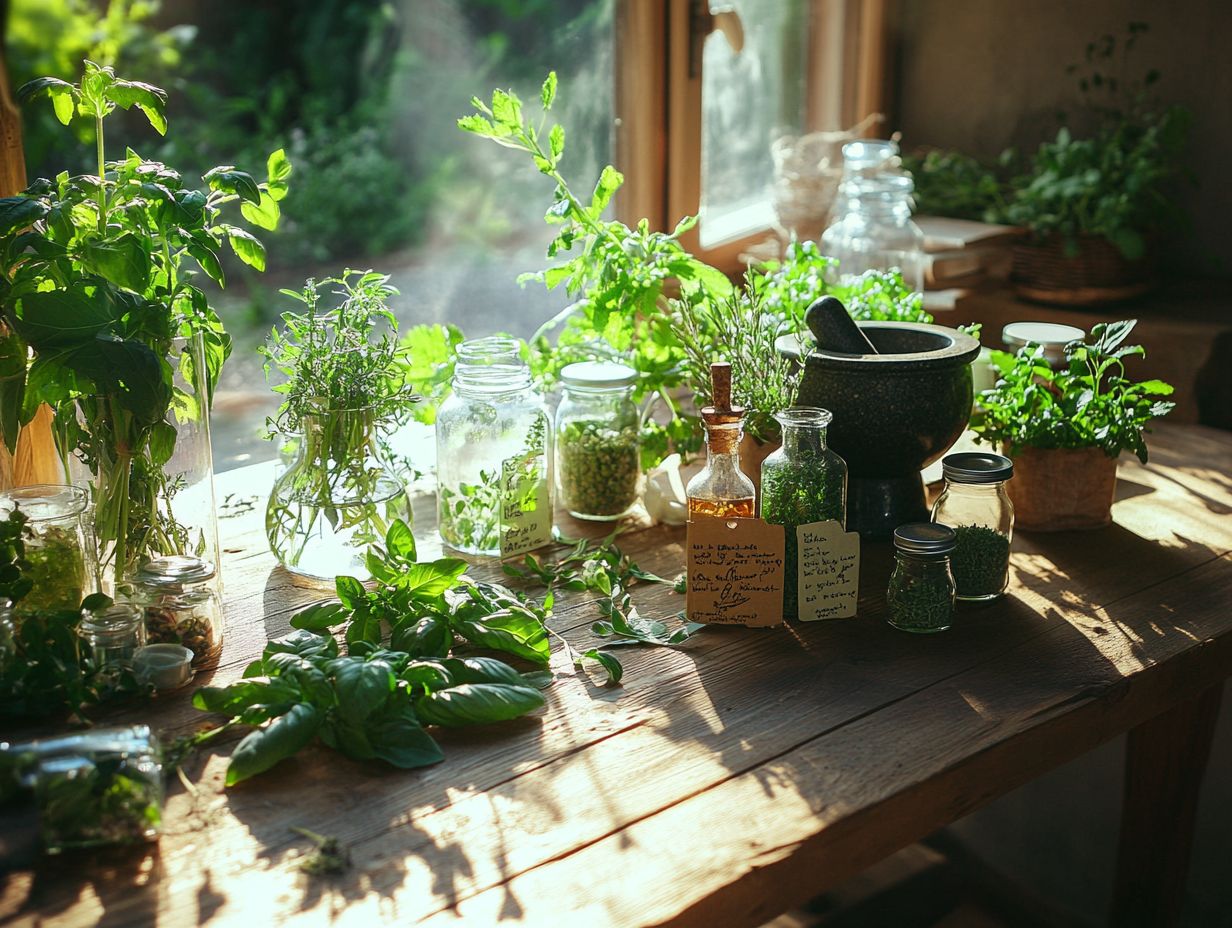
- Peppermint tea may soothe digestive issues like bloating and stomach pain.
- Garlic oil can be a powerful home remedy for ear infections.
- Turmeric paste can help reduce swelling and pain in the body.
1. Peppermint Tea for Digestive Issues
Peppermint tea is well-known for its soothing effects on digestive issues. Its natural compounds can relax the gastrointestinal tract and ease discomfort.
It s especially helpful for bloating and indigestion, which can leave you feeling sluggish. Many people find that drinking peppermint tea after meals helps with digestion and prevents gas buildup.
When combined with herbs like thyme, the benefits increase. Thyme helps reduce gas and cramping, working well with the refreshing qualities of peppermint.
2. Garlic Oil for Ear Infections
Garlic oil is an effective remedy for ear infections due to its strong antibacterial properties. It can target harmful bacteria while supporting your body s natural healing.
To make garlic oil, infuse crushed garlic cloves in a carrier oil, like olive oil, in a warm spot for several hours. You ll get an aromatic oil filled with the natural compound that gives garlic its health benefits.
When applied gently to the affected ear, it may relieve pain and reduce inflammation. Research shows garlic oil can effectively stop certain pathogens, making it a promising alternative treatment.
3. Turmeric Paste for Inflammation
Turmeric paste is famous for its anti-inflammatory properties and can alleviate swelling and pain. It s a staple in herbal medicine around the world.
The key ingredient, curcumin, can block inflammatory pathways. This means it helps not just with arthritis but also other inflammatory issues.
To make turmeric paste at home, mix turmeric powder with water and add a bit of coconut oil to enhance absorption. For extra benefits, consider adding ginger or black pepper.
This paste can also be applied topically to soothe joint pain and skin irritations, making it an invaluable addition to your natural health toolkit.
4. Chamomile Salve for Skin Irritations
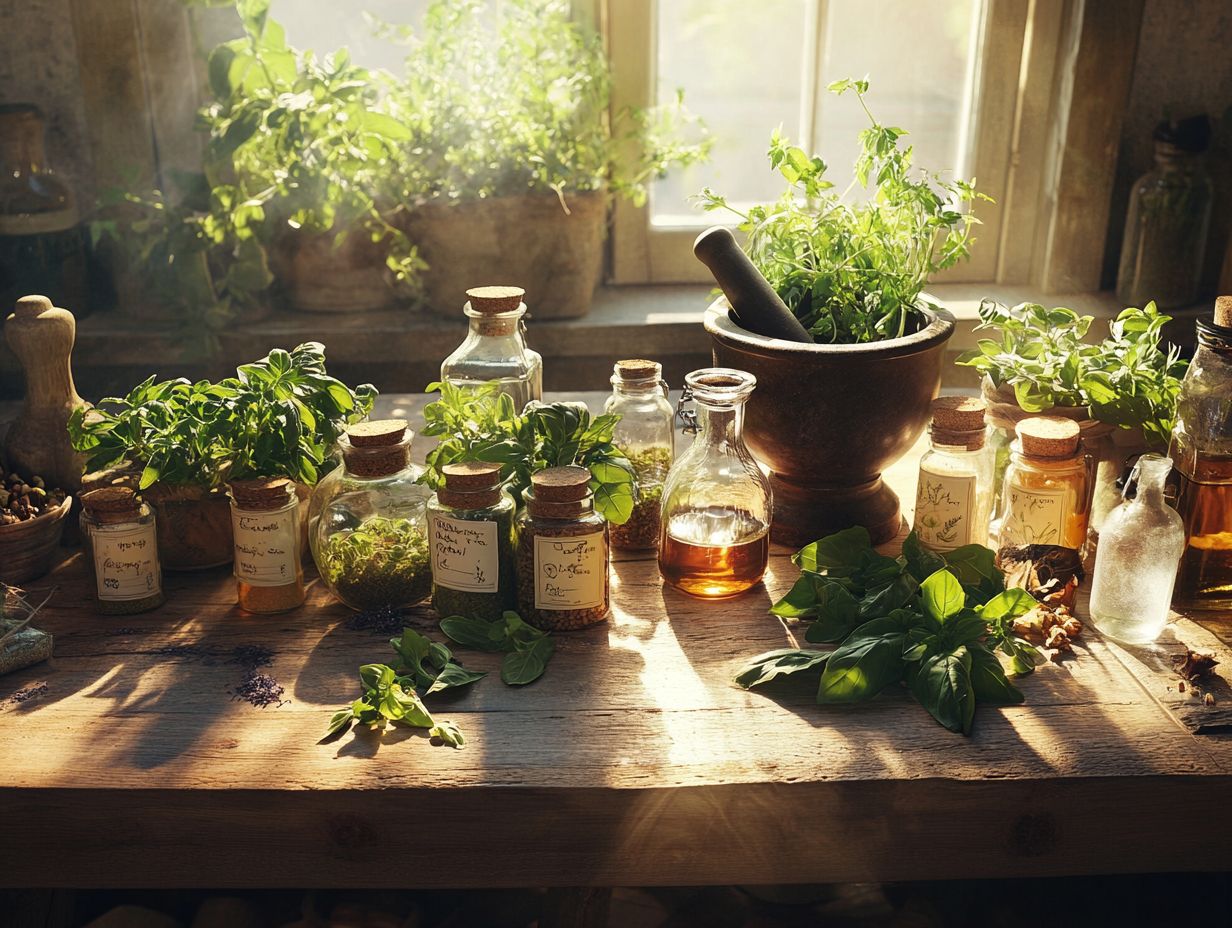
Chamomile salve is an exceptional topical solution for your skin irritations, using its soothing qualities to calm inflammation and promote healing. It is gentle enough for even the most sensitive skin.
This herbal remedy not only soothes your skin but also promotes faster healing. It is packed with antioxidants that shield your skin from environmental stressors and irritants. Many individuals discover that chamomile provides relief from eczema, psoriasis, and minor burns, facilitating quicker recovery with fewer side effects compared to commercial alternatives.
Creating your own chamomile salve is simple: steep dried chamomile flowers in oils like coconut or olive oil that help mix with other ingredients for several hours. Then, blend this infusion with beeswax to craft a balm that absorbs effortlessly into your skin.
Many experts recommend using chamomile salve, underscoring that regular use can significantly enhance your skin’s texture and elasticity. Users frequently share their positive experiences, noting remarkable improvements in their skin health, which underscores the salve’s effectiveness as a trusted solution for a variety of dermal issues.
5. Ginger and Honey Syrup for Cough and Cold
Ginger and honey syrup is not just a remedy; it s a delightful experience that effectively tackles coughs and colds. By harnessing the immune-boosting powers of ginger and the comforting sweetness of honey, find quick relief from your symptoms today while nurturing your overall health.
This dynamic blend offers a wealth of benefits. Ginger is celebrated for its anti-inflammatory and antioxidant properties, which can help soothe throat irritation and improve respiratory function. Meanwhile, honey, with its natural soothing abilities, works wonders to calm a cough and enhance your sleep quality.
To whip up this soothing syrup, simply combine fresh ginger juice with honey, letting the two elements harmonize for a few hours. This process maximizes both flavor and potency.
Research shows ginger can effectively stop your cough and shorten the duration of cold symptoms, while honey has been proven to be an effective natural cough suppressant, especially in children. Together, they form a powerful duo for combating respiratory issues and elevating your overall wellness.
What Are Herbal Remedies and How Do They Work?
Herbal remedies, derived from the bounty of nature, are your gateway to traditional herbalism, promoting natural healing by tapping into the medicinal properties of various plants that have been cherished for centuries.
These remedies come in an impressive array of preparations, from soothing teas to potent tinctures concentrated herbal extracts often used for quick absorption and convenient tablets, all expertly crafted to harness the therapeutic benefits of specific botanical components. Traditional herbalism embraces a holistic approach, considering your body s unique needs, which stands in contrast to the symptom-focused perspective often found in modern medicine.
Interestingly, these two realms can complement one another, as many contemporary health practitioners are beginning to appreciate the wisdom of herbal traditions.
Ongoing research is crucial in this arena, validating the efficacy and safety of herbal practices and opening the door for the potential integration of these insights into mainstream healthcare. Embracing this synergy could elevate your health journey to new heights.
What Are the Benefits of Using Herbal Remedies?
The benefits of using herbal remedies are truly remarkable. They offer a pathway to natural healing, effectively addressing various ailments and supporting overall wellness all without the harsh side effects that often come with modern medicine.
These natural solutions can significantly enhance your immunity, provide relief from chronic inflammation, and help manage your stress levels. Take echinacea, for example; it’s well-known for its immune-boosting properties. Then there’s turmeric, celebrated for its powerful anti-inflammatory benefits.
Incorporating these herbs into your daily routine not only complements traditional therapies but also enables you to take control of your health. Herbal remedies are often rich in antioxidants and phytonutrients, aiding in detoxification and promoting overall cellular health. This makes them a valuable addition to a comprehensive wellness strategy you can embrace.
What Are Some Common Herbs Used in Remedies?
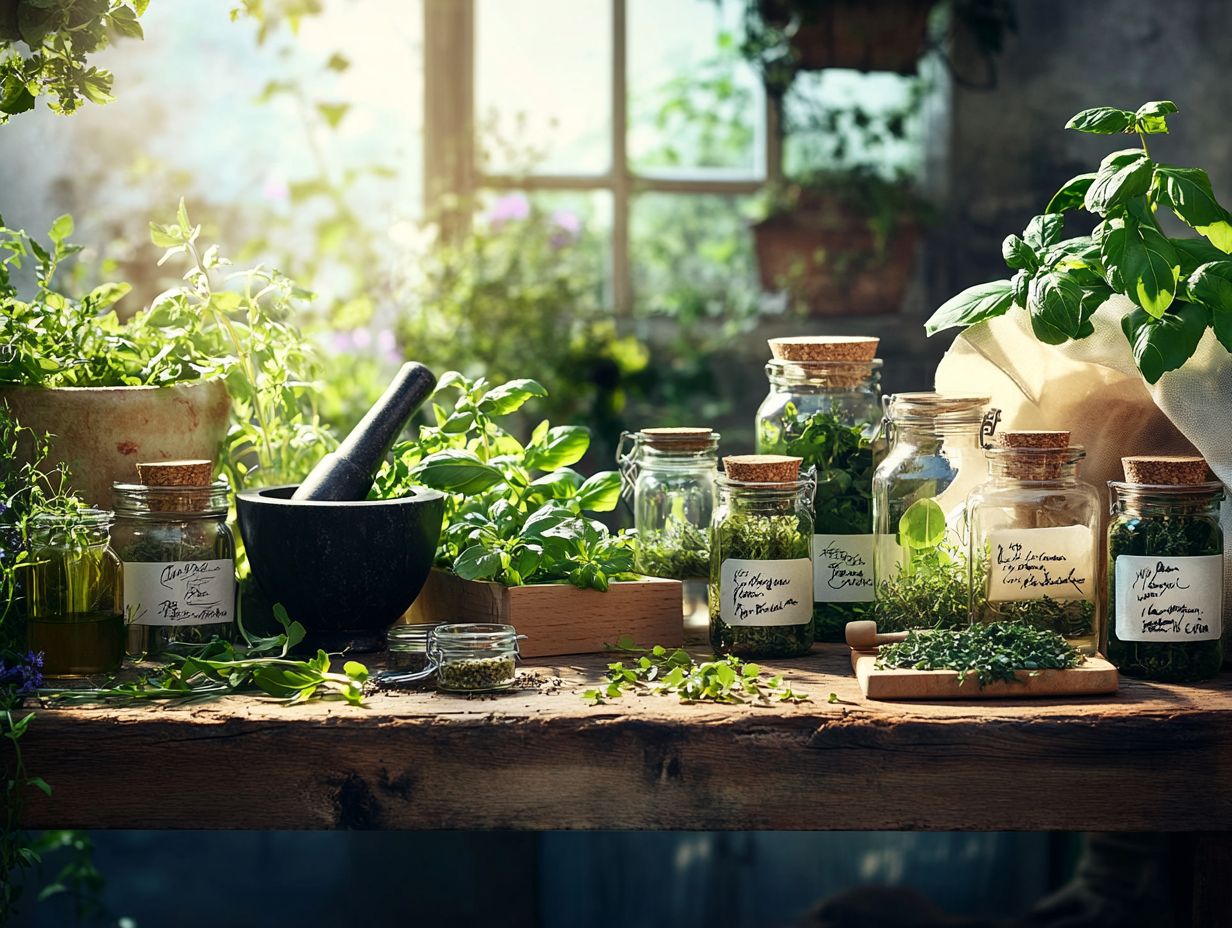
Some common herbs you might find beneficial in herbal remedies include chamomile, known for its calming effects; ginger, which supports digestive health; and thyme, known for its ability to fight germs. Each of these herbs brings unique medicinal qualities that have been cherished throughout history.
Peppermint is another great option for headaches and digestive discomfort. Turmeric, famed for its anti-inflammatory properties, can be easily added to soups or golden milk. Oregano is also recognized for its antioxidant benefits and adds flavor to many dishes.
By incorporating these herbs into your daily meals or brewing them into soothing teas, you re not only enhancing your culinary experiences but also promoting your overall well-being. Discover how these herbs can transform your health start today!
How Can One Make Herbal Remedies at Home?
Making herbal remedies at home is a rewarding journey that invites you to explore techniques like steeping herbs for teas, creating herbal extracts, or drying herbs for long-term storage. This process allows you to harness the remarkable healing power of plants effectively.
By carefully selecting high-quality ingredients, you can elevate the potency of these natural concoctions. For example, when preparing teas, using fresh leaves or well-dried herbs ensures you capture maximum flavor and benefits.
Tinctures are strong liquids made from herbs and require attention to detail, especially regarding the ratio of herbs to solvent, to yield a concentrated form of herbal healing.
Proper storage of these remedies is vital. Whether you re using dark glass bottles for tinctures or airtight containers for dried herbs, keeping their efficacy over time is crucial. Following best practices preserves the integrity of your remedies and guarantees a consistently enjoyable experience for you.
Are There Any Risks or Side Effects of Using Herbal Remedies?
While herbal remedies may offer many health benefits, it s vital to recognize that they can also pose risks and potential side effects, especially if they aren’t used correctly or if they interact with modern medicines.
Be aware that some herbal products can lead to negative effects, including digestive issues, allergic responses, or even toxicity, depending on your health status and the quality of the herbs in question.
Mixing herbal supplements with prescription drugs can result in unexpected interactions that may alter how well your conventional treatments work. Consulting with healthcare professionals is essential before starting herbal therapies, especially if you’re on medication.
Doing so ensures you understand any contraindications or potential risks involved.
How Can One Incorporate Herbal Remedies into Their Health Routine?
Incorporating herbal remedies into your health routine can be an effortless endeavor! You can explore simple home remedies that align with your lifestyle while elevating your overall wellness through nature s bounty.
A great way to begin is by infusing your everyday dishes with herbs like basil; not only will it enhance flavor, but it also offers extra health benefits that your body will appreciate.
Crafting herbal teas can become a delightful ritual in your life. Chamomile, for example, can usher in relaxation, while ginger serves as a trusty ally for digestion.
Understanding each herb’s unique properties allows you to choose the perfect remedies for your needs whether it’s a soothing blend for evening tranquility or a refreshing infusion to awaken your senses in the morning.
With just a few thoughtful additions, herbal remedies can seamlessly enrich your daily life.
Frequently Asked Questions
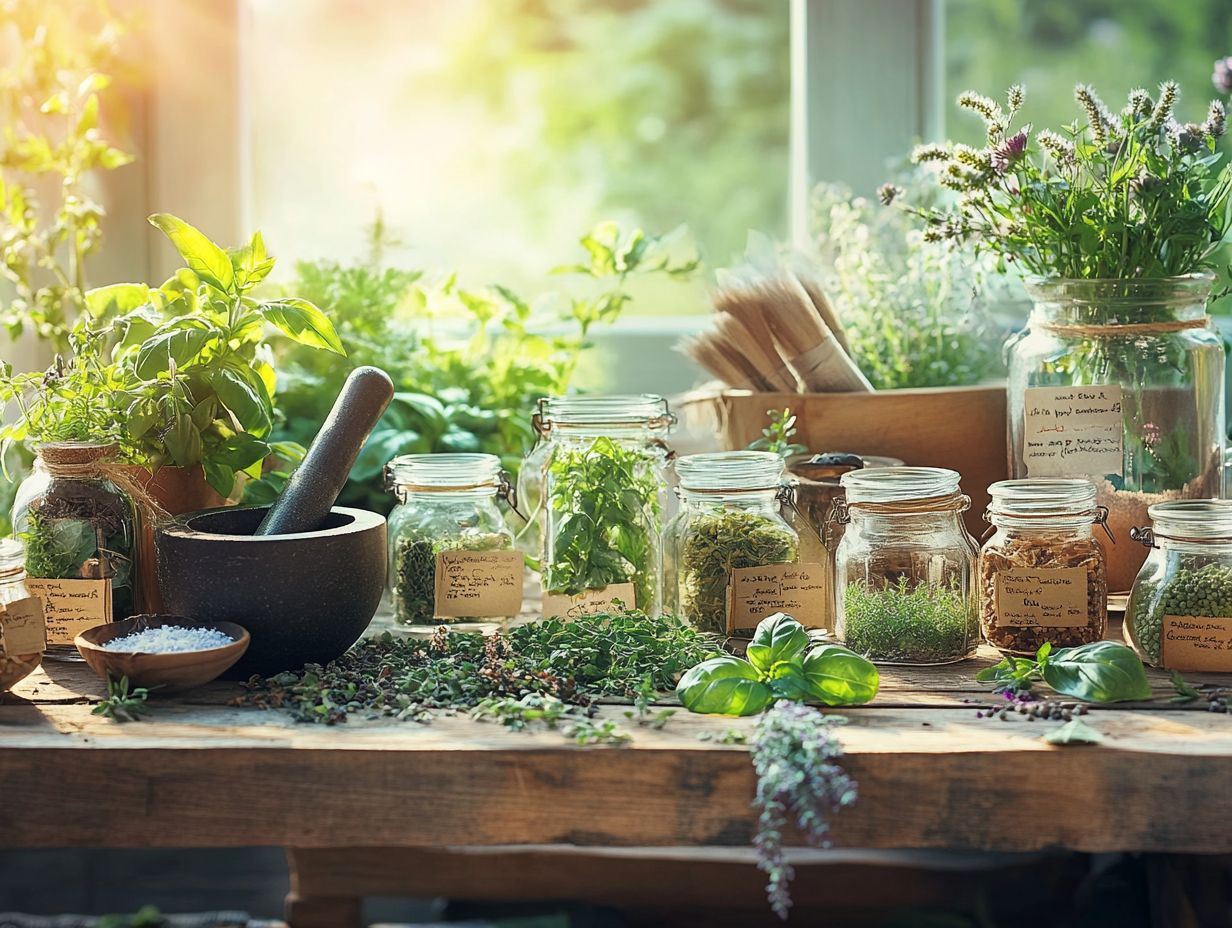
What are 5 easy herbal remedies that I can make at home?
1. Lemon Ginger Tea: Mix 1 tablespoon of fresh grated ginger root with hot water and lemon juice. Add honey for a soothing remedy for sore throats and upset stomachs.
2. Lavender Infused Oil: Combine dried lavender flowers with olive oil. Let it sit for several weeks to create a natural remedy for skin conditions like eczema.
3. Peppermint Steam: Boil a pot of water and add fresh peppermint leaves. Inhale the steam to clear congestion and ease headaches.
4. Chamomile Salve: Melt beeswax with coconut oil and mix in dried chamomile flowers. This salve heals minor burns, cuts, and scrapes.
5. Eucalyptus Chest Rub: Mix eucalyptus essential oil with coconut oil. Rub it on your chest to relieve coughs and congestion.
Are these herbal remedies safe to use?
It is important to research and consult with a healthcare professional before using any natural remedies. While generally safe, they may interact with certain medications or have negative effects on individuals with specific health conditions.
Do I need special equipment or ingredients to make these remedies?
No, you can make all of these remedies with simple kitchen tools and ingredients. For best results, use fresh, organic herbs and high-quality carrier oils.
Can these remedies be used for children?
Some remedies, like peppermint steam and eucalyptus chest rub, may not be suitable for children under 6. Always research and consult with a pediatrician before using any herbal remedies on children.
How long do these remedies last?
Most remedies can be stored for several weeks to months in a cool, dry place. However, it’s best to make small batches and use them within a few weeks for maximum potency.
Are these remedies effective for treating serious medical conditions?
These herbal remedies have been used for centuries to promote health, but they are not a substitute for medical treatment of serious conditions. Always consult a healthcare professional for proper diagnosis and treatment of any health concerns.

